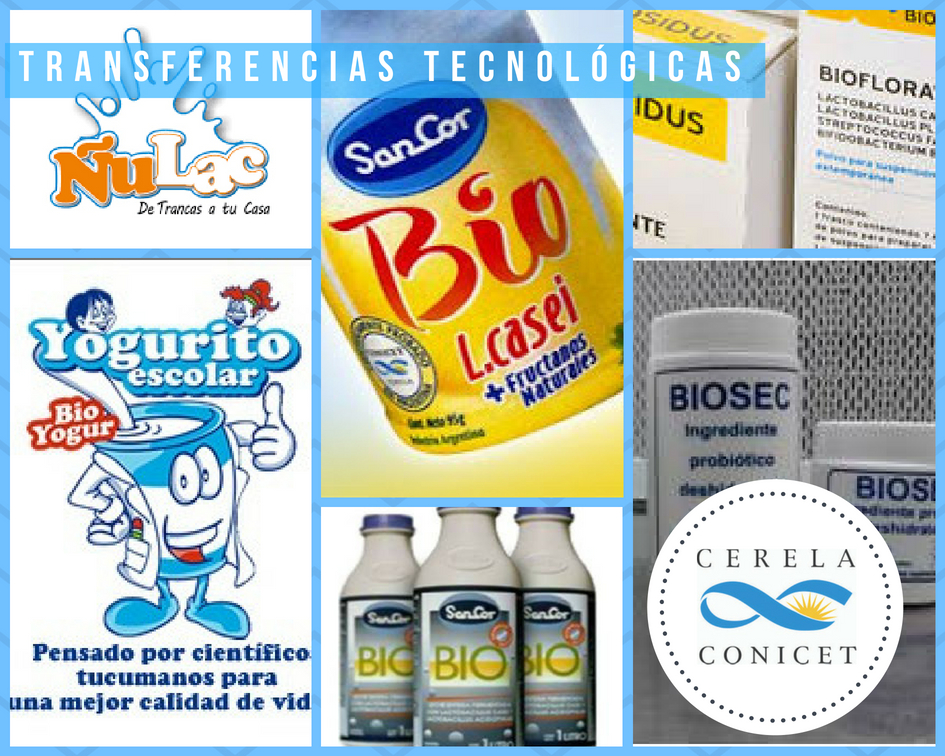Bioflora®, is a formula to restore the balance of the intestinal microbiota during or after treatment of intestinal inflammation. This product has been formulated with four beneficial lactic acid bacteria isolated from feces of healthy people: Lactobacillus casei, Lactobacillus plantarum, Streptococcus faecalis and Bifidobacterium brevis. The microorganisms were selected for their probiotic properties in CERELA. The Pilot Plant of Process Industrial Microbiological (PROIMI) dealt with the technological production and drying of microorganisms in the formula. Both Institutes are dependencies of the CONICET. The development of the product was funded by Bio Sidus, an Argentine Laboratory that is also responsible for its marketing.
AGENA BLOCAGIN Y GINEGEA CANDIDA
These formulas contain Lactobacillus salivarius CRL 1328, a microorganism isolated from the vagina of a woman in Tucuman (Argentina) that produces salivaricina and is combined with other lactic acid bacteria. Vaginal lactic acid bacteria were selected for their probiotic properties in in vitro assays and animal experimental models. Subsequently, they were administered to women in a phase I clinical trial. It has been licensed along with the other 5 (five) lactobacilli vaginal probiotic strains to the italian Company Probiotical – Anidral for marketing in Europe.
SANCOR BIO AND SANCOR BIO + NATURALS FRUCTANS
SanCorBio is defined as a probiotic food, and was jointly developed between CERELA-CONICET and SanCor in the 1980s. It was a pioneer project that allowed us to breach the borders of our country, with the participation of the Danish company Christian Hansen. It arised as a esponse to a typical problem of child populations with nutritional deficiencies. The pediatricians of the Children’s Hospital of Tucuman (Argentina), raised to Dr. Guillermo Oliver their concerns regarding the high prevalence of chronic diarrhea and the urgency to control it. Thus, the Technological Ecophysiology Laboratory began with enthusiasm the search for lactic acid bacteria capable of neutralizing the causes of this disease. The investigations led to the selection of Lactobacillus casei CRL 431 and L. acidophilus CRL 730, both of human origin. The SanCorBio product has been sold in grocery stores since 1995; it received the "Sial de Oro 1998" prize awarded in Paris to the best food products in the world. The continuity of studies in this subject raised another challenge, oriented towards a symbiotic food, which was concluded with the design of SanCorBio + Natural Fructans that was sold publicly between 2006 to 2017.
CERELA actively participates in social food programs at the provincial and national levels, with the commitment to provide answers to specific problems of society. This is how scientific-technological programs/products with socio-productive impacts were born, as an exhaustive collaboration work between CERELA, the Ministries of Social Development, Education and Health, the portfolio of Science, Technology and Innovative Production of the Nation; local SMEs are in charge ofelaborating the probiotic dairy products. Presently, this scientific project of technology transfer was successfully adopted in other provinces such as Santiago del Estero, San Juan and Entre Ríos and the Municipality of Lujan through agreements between CONICET-Provincial Governments and Municipalities.Four products were included in the Provincial Social Program, benefiting school age children belonging to schools of the interior and of the Gran San Miguel de Tucumán, whose execution is carried out through the Ministry of Social Development of the province of Tucumán. PROBIOTIC CHEESE (year 2014), type tybo cheese that contains strain CRL1505Ò (2012), a probiotic chocolate milk containing the strain CRL1505Ò (2010), a bio-protein powder of easy transport and preservation, containing the dehydrated strain CRL1505, to be added to all types of liquid food providing the same benefits of fresh food; CHOCOLETÒ, a probiotic food that since 2008 the Government of Tucumán included in the food plans of the province for the benefit of all children who attend public schools. Given the demand of the new probiotic food program, the constant scientific-technological research made it possible to develop other products using the CRL1505 strain, thus expanding the benefits for the children who consume it. BIOSECÒ, whose effects to reinforce the natural defenses of school-age children, decreasing the incidence of respiratory and intestinal infections, was demonstrated through clinical trials. YOGURITO. In 2007 a yogurt was developed with the probiotic strain Lactobacillus rhamnosus CRL 1505 (CRL1505Ò).As a result of this successful program, the Association of Milk Producers of Tucumán (Aproleche) and private companies, with the scientific and productive participation of CERELA and the Government of Tucumán, will soon launch the "Ñulac" brand, which will have two probiotic products, a drinkable yoghurt and cheese, made using the probiotic strain CRL1505
